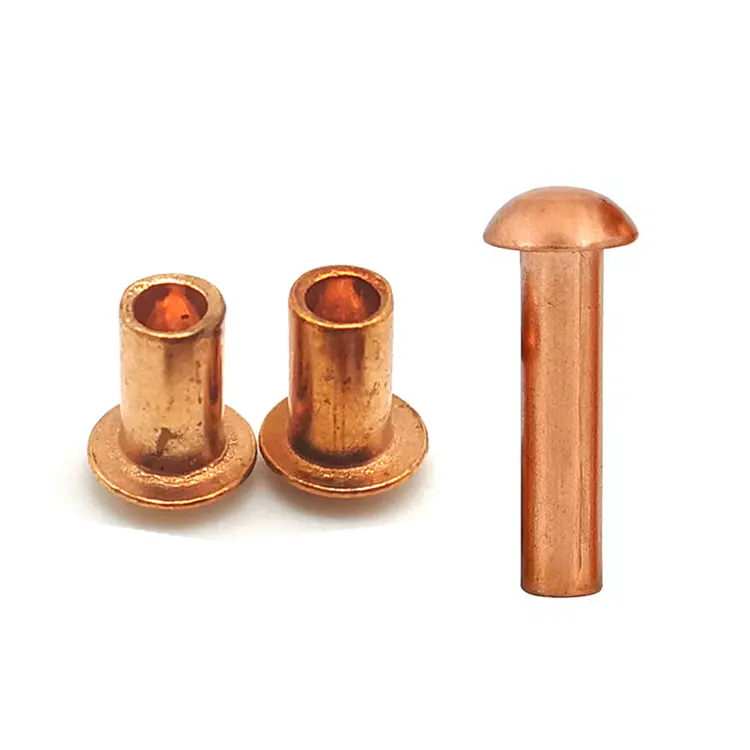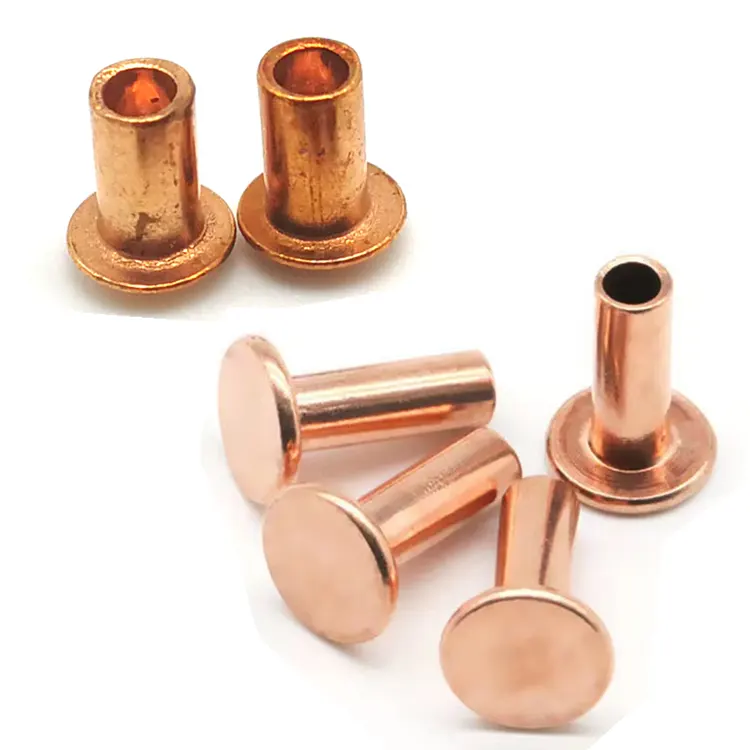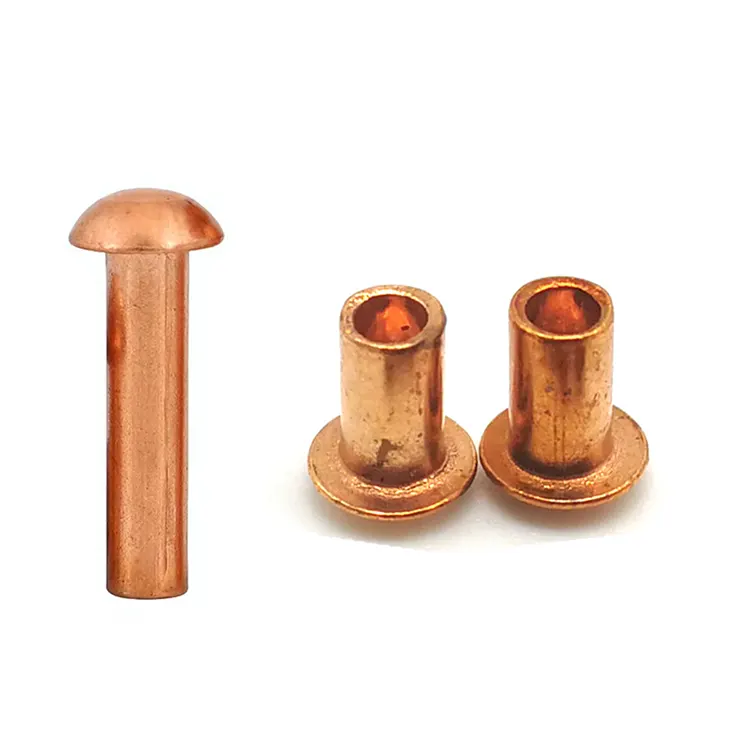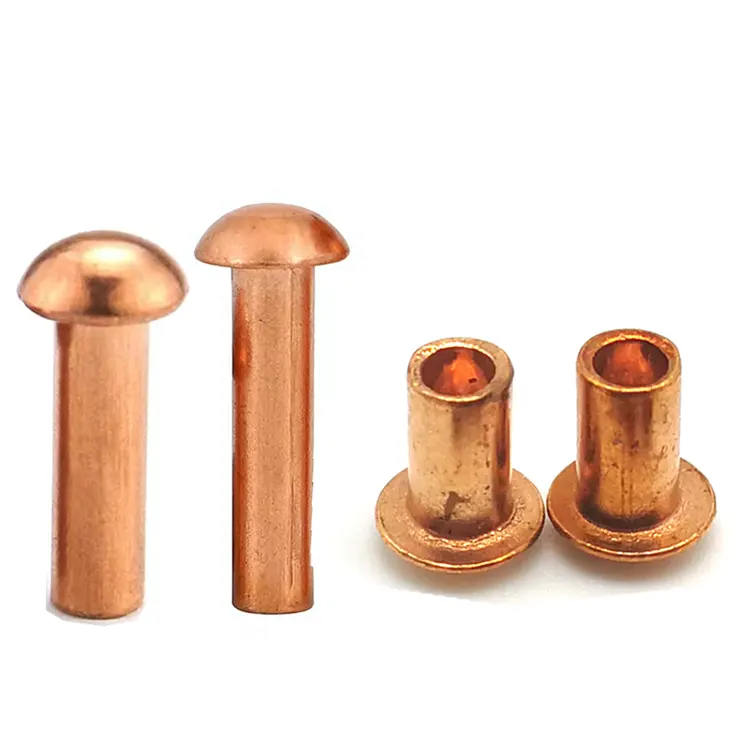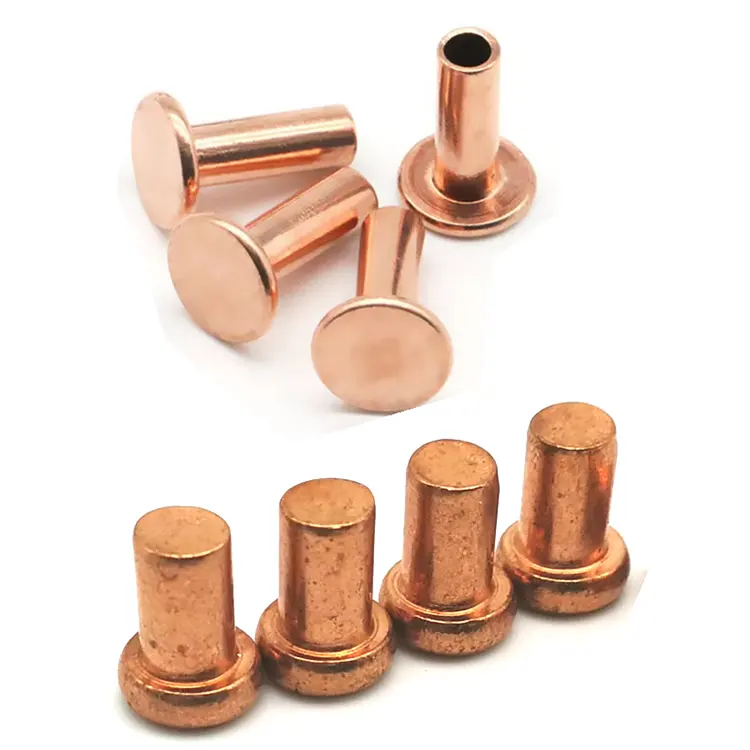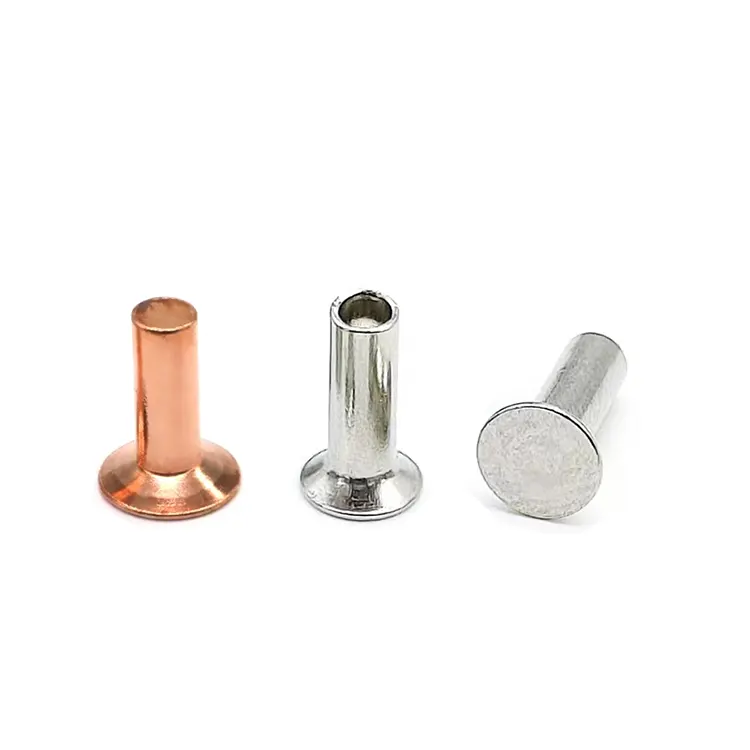Klinknagels
As one of professional manufacturer in China, Notin would like to provide you Rivets. And we will offer you the best after-sale service and timely delivery.
What is a rivet?
A rivet is a permanent mechanical fastener used to join two or more materials. Rivets work by inserting a metal pin into an aligned hole and deforming the end, creating a strong, secure, and durable connection. Unlike temporary fasteners like screws, rivets do not rely on threads, but instead form a permanent connection, making them ideal for applications requiring high strength, durability, and vibration resistance.
Classification of Rivets
Rivets are typically categorized by head shape, degree of hollowness, or material.
Based on head shape, rivets can be classified as flat head rivets, round head rivets, countersunk head rivets, mushroom head rivets, universal head rivets, truss head rivets, etc.

Based on degree of hollowness, rivets can be classified as solid rivets, semi-tubular rivets, or full tubular rivets.
Based on material, rivets can be classified as brass rivets, stainless steel rivets, steel rivets, aluminum rivets, copper rivets, etc.

What surface finishes are available for rivets?
Rivet surfaces are typically treated with rust-proofing treatments, primarily electroplating, including zinc plating, nickel plating, chrome plating, tin plating, gold plating, and silver plating. Electroplating is a common rust-proofing method for rivets. It applies a layer of plating to the rivet surface through physical or chemical methods. The plating effectively prevents corrosion and rust, while also providing a certain aesthetic effect.
Another special surface treatment method is head coating. Head coating is performed after the rivet is electroplated. This allows for a variety of colors on the rivet head, achieving an aesthetically pleasing finish.
Aluminum rivets cannot be electroplated, but they can be anodized. Anodizing also allows for a variety of color options, but the unit price is higher than electroplating.
Rust-proofing the rivet surface is crucial, effectively extending the rivet's service life and ensuring a secure connection. Different rust-proofing methods are suitable for different environments and applications, so the choice should be tailored to the specific situation.
- View as
Koperen klinknagels met ronde kop
Koperen klinknagels met ronde kop zijn een soort bevestigingsmiddel dat veel wordt gebruikt in de industriële productie, meubelmakerij en andere gebieden. Koper, ook wel zuurstofvrij koper genoemd, is een zeer zuivere koperlegering die wordt gekenmerkt door uitstekende elektrische en thermische geleidbaarheid, evenals een goede corrosieweerstand en ductiliteit. Deze eigenschappen zorgen ervoor dat koperen klinknagels met ronde kop stabiele prestaties behouden in verschillende omgevingen, waardoor hun levensduur wordt verlengd. Bovendien heeft koper bepaalde antibacteriële eigenschappen, die het risico op bacteriegroei kunnen verminderen in producten die veelvuldig in contact komen met het menselijk lichaam.
Lees verderStuur onderzoekKoperen klinknagels
Nuote Metals is een professionele klinknagelfabrikant gevestigd in Dongguan, China. De door ons vervaardigde koperen klinknagels zijn gemaakt van C1100-koper. Koperen klinknagels zijn een veelgebruikt bevestigingsmiddel. Koper heeft een uitstekende thermische geleidbaarheid, waardoor het veel wordt gebruikt in elektrische toepassingen en warmteafvoertoepassingen. Bovendien bieden koperen klinknagels een uitstekende bewerkbaarheid en plasticiteit, waardoor ze in verschillende vormen en maten kunnen worden geproduceerd.
Lees verderStuur onderzoekKoperen pankopklinknagels
Koperen platkopklinknagels zijn zeer zuiver en bieden een uitstekende geleidbaarheid, waardoor ze geschikt zijn voor toepassingen die een hoge geleidbaarheid vereisen. Nuote Metals is gespecialiseerd in de productie van koperen platkopklinknagels. We gebruiken hoogwaardige koperkwaliteiten, zoals C1100, maar we kunnen ook aangepaste kwaliteiten produceren. Onze koperen klinknagels ondergaan een speciale oppervlaktebehandeling om oxidatie te weerstaan en zijn bestand tegen een zoutsproeitest van 48 uur.
Lees verderStuur onderzoekKoperen paddestoelkopklinknagels
Koperen paddestoelkopklinknagels zijn mechanische componenten die worden gebruikt om twee of meer materialen vast te maken. Ze hebben meestal een paddestoelvormige kop en een massieve of halfholle staaf aan het andere uiteinde. Tijdens de installatie wordt het andere uiteinde gehamerd of geslagen met een gespecialiseerde klinkmachine, waardoor het uitzet en de andere kop vormt, die vervolgens op zijn plaats klikt. Nuote Metals is specialist in koperen paddestoelkopklinknagels. We bieden een uitgebreid assortiment klinknagelspecificaties en maken gebruik van meer dan 40 klinkmachines van verschillende afmetingen om aan de behoeften van de klant te voldoen.
Lees verderStuur onderzoekKoperen klinknagels met platte kop
Nuote Metals, gevestigd in Dongguan, China, is een professionele klinknagelfabrikant. Onze klinknagels zijn van hoge kwaliteit en gegarandeerde levering, waardoor ze een gunstige reputatie genieten bij binnenlandse en internationale klanten. Onze koperen klinknagels met platte kop zijn gemaakt van hoogwaardig koper en bieden een glad, delicaat oppervlak en een stabiel, stevig gevoel. Hun ontwerp met platte kop vergroot niet alleen het contactoppervlak, maar verspreidt ook effectief de druk, waardoor een stabielere verbinding wordt gegarandeerd.
Lees verderStuur onderzoekKoperen klinknagels met verzonken kop
Koperen klinknagels met verzonken kop, geproduceerd door Nuote Metals in China, zijn veel voorkomende metalen bevestigingsmiddelen die voornamelijk worden gebruikt in de machinebouw, elektronische apparatuur, meubelassemblage en andere industriële gebieden. Als traditioneel metaalmateriaal heeft koper een uitstekende elektrische en thermische geleidbaarheid en corrosieweerstand, waardoor het populair is in specifieke toepassingen. Klinknagels met verzonken kop zijn bevestigingsmiddelen die worden vervaardigd door middel van koude kop- of warme smeedprocessen. Hun eenvoudige structuur vereist gereedschap voor het klinken om een gespecialiseerde verbinding te creëren.
Lees verderStuur onderzoekWhat are the advantages of rivets over other fasteners?
1. Ease of Installation
Rivets are fast to install, and even fully automated for high-volume applications, resulting in a simple and efficient operation process.
2. Connection Reliability
The riveting process is standardized, with strict quality control, resulting in highly stable connections. Visual inspection allows for quick verification of connection quality.
3. Vibration and Impact Resistance
Rivets connect through deformation or interference fit, providing strong clamping force and excellent vibration resistance, capable of withstanding vibration and shock.
4. Low Cost
Rivets are easy to install and can be fully automated, saving significant labor costs.
What are the advantages and disadvantages of rivets made of different materials?
Aluminum Rivets
Advantages: Lightweight, reduces overall product weight, low cost, suitable for general civilian applications.
Disadvantages: Low tensile and shear strength, unsuitable for high-strength workpieces, prone to electrochemical corrosion when in contact with metals such as stainless steel.
Stainless Steel Rivets
Advantages: Strong corrosion resistance, high hardness, suitable for high-strength workpieces (such as marine equipment)
Disadvantages: Higher cost, typically more expensive than aluminum rivets of the same specification.
Brass and Copper Rivets
Advantages: Excellent conductivity (such as connecting electronic components), good corrosion resistance.
Disadvantages: Higher cost, more difficult to process.
Steel Rivets
Advantages: High hardness, high connection reliability, and wide applicability.
Disadvantages: Compared to other materials, iron rivets are more prone to rusting.
What are the main applications of rivets?
Rivets have a wide range of uses, from small items like a pair of scissors to large items like airplanes and ships, as well as in high-precision medical applications.
Industrial Manufacturing
Rivets are used in a wide variety of industrial fields, wherever there is a need to connect two or more materials.
Electronics
Rivets secure heat sinks and chips, providing both vibration damping and noise reduction, and are widely used in the cooling systems of electronic products such as computers and mobile phones.
Automotive
Rivets are widely used to connect components of automobile bodies and chassis, such as doors and hoods. Their lightweight and corrosion-resistant properties make them an indispensable joining method in automotive manufacturing.
Aerospace
In aircraft manufacturing, rivets are used to connect different fuselage components, such as wings and tailplanes. Millions of rivets create high-strength, corrosion-resistant joints. Aluminum and titanium alloy rivets are often used to connect components of corresponding materials, ensuring stability in extreme environments.
Rivets are used everywhere. The above examples only represent a small number of their applications. We see rivets everywhere in our daily lives, such as on scissors, folding beds, and strollers etc. Rivets can be customized to different sizes and materials depending on the application.
Nuote Metals has specialized in the rivet industry for over a decade. Our factory is located in Dongguan, a city known as the "World Factory," a city with a developed industry and convenient transportation. This allows us to respond quickly when acquiring raw materials and supporting surface treatments, meeting our customers' needs for quick access to samples and bulk orders. We produce 10 million rivets daily and have molds of various specifications, allowing us to produce rivets as small as 0.8mm and as large as 10mm. We welcome your inquiries and visits.







